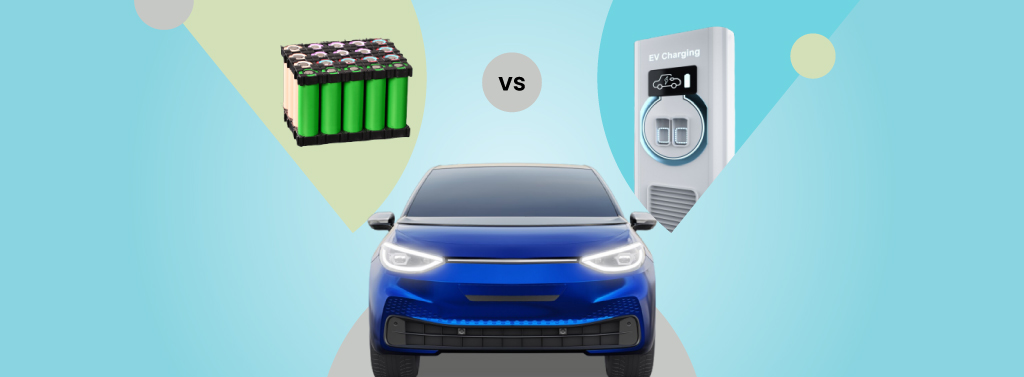-

Life Cycle Assessment of Lithium-ion Batteries: A Critical Review
Recent projections suggest that the global production of lithium-ion batteries will skyrocket to 2,857 GWh by 2030. The frequent use of lithium-ion batteries in various systems has necessitated an in-depth understanding of their environmental impacts. Life Cycle Assessment (LCA) is a tool that offers a systematic approach to estimating the environmental burdens of a battery’s…
-

EV Battery Breakthrough: Turning Waste Energy into Extra Miles
At present, there are more than 40 million EVs on the road worldwide; a significant jump from 26 million in 2022 reinforcing the increasing commitment toward cleaner and sustainable transportation. That said, widespread adoption of EVs isn’t free from roadblocks, primarily centred around their limited driving range, unsustainable EV battery recycling, and inadequate charging infrastructure. …
-

AI on the Road: How Machine Learning is Revolutionizing EV Range Prediction
As electric vehicles (EVs) gain popularity, range anxiety remains a significant challenge for widespread adoption. Unlike traditional vehicles with available refueling options, EV owners, on the other hand, have to plan their journeys around charging availability and battery capacity. Artificial intelligence (AI) and machine learning (ML) offer a promising solution to this challenge by analyzing…
-

EV Battery Swapping vs. Fast Charging: Which Will Dominate the EV Market?
As EVs become increasingly common on our roads, a critical challenge emerges: how do we keep all these vehicles charged efficiently? The growing demand for EV battery fast charging is putting unprecedented strain on existing infrastructure. EV owners now face longer wait times at charging stations and increasing range anxiety—the fear of running out of…
-

EV Battery Reliability: How Battery Management Systems are Powering the Future
Amidst continuous developments in the electric vehicle (EV) industry, manufacturers often face challenges in ensuring battery reliability, efficiency, and safety in these vehicles. Battery Management Systems (BMS) optimizes performance, extending battery life, and enhancing the safety of these vehicles. At present, EV battery management is witnessing a transformation through the use of advanced BMS technology,…
-

Exploring Challenges and Solutions in Car Lithium Battery Recycling
As the demand for electric vehicles (EVs) skyrockets, so does the need for lithium-ion batteries (LIBs). However, the increased demand for LIBs has brought scrutiny to the sourcing and disposal of the raw materials used in their production. Improper disposal of LIBs can lead to soil and groundwater contamination due to the hazardous materials they…
-

From Graphite to Silicon: The Evolution of Battery Anodes
Silicon anode batteries, boasting an impressive theoretical capacity of 4,200 milliamperes per hour per gram, are poised to reshape the field of energy storage, leaving traditional graphite anodes in the dust. This extraordinary capacity makes these batteries a suitable candidate for developing the next generation of high-energy-density batteries. These improvements could benefit the electronics industry,…
-

Top 10 Visionary Startups Transforming the Future of EV Battery Technology
Research in EV battery technology is booming, with startups pioneering flow, solid-state, and improved lithium-ion technologies. Some focus areas include energy density, charging speed, lifespan, and safety, driving sustainable energy adoption, and a growing EV market. Recent advancements in EV battery technology are leading to a steady shift from traditional lithium-ion batteries toward solid-state batteries.…
-

5 Hidden Heroes of the EV Battery Industry: Small Companies Making Big Waves
With increasingly louder calls for sustainable and greener transportation have prompted a significant rise in EV sales. This, in turn, has invariably fueled the growth of the EV battery industry spurred by the rising demand for high-performing batteries. The global demand for EV batteries surpassed 750 GWh in 2023; a 40% rise compared to 2022. …
-

Methane-Based EV Battery: A Sustainable Solution or Pipe Dream?
Introduction Methane, a simple hydrocarbon (CH₄), is abundant and can be sourced from both fossil fuels (natural gas) and renewable sources (biogas). It can be processed into hydrogen, carbon, and other compounds through methods such as pyrolysis and reforming, which can then be used to create EV battery components. This contribution can be reformed in…